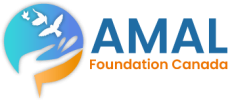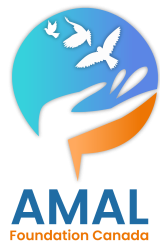Health Education

Health Education
As a community health and welfare organization, Amal Foundation Canada is dedicated to improving the health and wellbeing of marginalized populations, including youth, refugees, and new immigrants. One of the ways we achieve this is through health education, which plays a critical role in empowering individuals to make informed decisions about their health and lead healthy lifestyles.
Health education is the process of providing individuals with the knowledge, skills, and tools they need to make informed decisions about their health. This can include information about healthy eating, exercise, disease prevention, and management, mental health, and more. Health education is important for people of all ages, as it can help prevent chronic diseases, reduce the risk of injury, and improve overall well being.
At Amal Foundation Canada, we believe that health education is a key component of our work. We offer a range of health education programs to help individuals make informed decisions about their health. Our programs are designed to be accessible, culturally appropriate, and engaging and are delivered by qualified health professionals who are passionate about improving the health outcomes of marginalized populations.
Key Components of Health Education
Needs Assessment: Before designing and implementing a health education program, it is important to assess the needs of the target population. This can include conducting surveys, focus groups, and other assessments to identify the specific health needs, challenges, and priorities of the community.
Curriculum Development: Based on the needs assessment, a curriculum should be developed that includes information, skills, and tools relevant to the target population. The curriculum should be evidence-based, culturally appropriate, and tailored to the specific needs and challenges of the community.
Delivery Methods: There are many different ways to deliver health education, including workshops, classes, webinars, and individual counseling. The delivery method should be based on the needs and preferences of the target population, as well as the resources available.
Evaluation: It is important to evaluate the effectiveness of health education programs to ensure they are meeting the needs of the target population and achieving the desired outcomes. Evaluation can include pre- and post-tests, surveys, focus groups, and other methods to assess changes in knowledge, attitudes, and behaviors.


Health Education Programs
Nutrition Education: Our nutrition education programs aim to improve access to healthy foods and promote healthy eating habits. We offer workshops and classes on topics such as healthy meal planning, grocery shopping on a budget, and cooking healthy meals.
Exercise and Physical Activity Education: Our exercise and physical activity education programs aim to promote physical activity and reduce sedentary behavior. We offer workshops and classes on topics such as the benefits of exercise, how to get started with an exercise routine, and how to exercise safely.
Disease Prevention and Management Education: Our disease prevention and management education programs aim to improve access to healthcare and empower individuals to manage chronic diseases. We offer workshops and classes on topics such as diabetes prevention and management, hypertension management, and asthma management.
Mental Health Education: Our mental health education programs aim to reduce the stigma associated with mental illness and promote mental health and wellbeing. We offer workshops and classes on topics such as stress management, mindfulness, and self-care.
Health Literacy Education: Our health literacy education programs aim to improve access to health information and empower individuals to make informed decisions about their health. We offer workshops and classes on topics such as how to read and understand health information, how to navigate the healthcare system, and how to communicate effectively with healthcare providers










